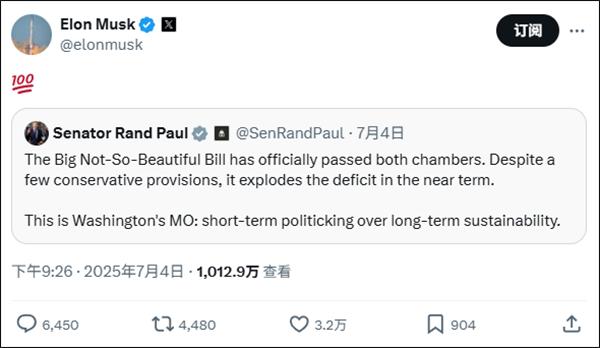
On July 4th, local time, Elon Musk, CEO of Tesla, was the first to respond to the “Bigger is Better” bill passed by the US Congress. On social media platform X, he supported Republican Senator Rand Paul’s criticism of the bill, stating that it would trigger a fiscal deficit and undermine long-term fiscal sustainability.
Musk reposted and supported a post by Republican Senator Rand Paul from Kentucky. Paul wrote: “The bill will trigger a fiscal deficit. Short-term political activities are higher than long-term sustainability, which is the style of Washington.” Paul is one of three Republican senators who voted against in the Senate vote.
Meanwhile, Musk had already called the bill on July 1st on social media as “the debt slavery bill,” publicly questioning Trump’s fiscal policy direction.
According to an assessment by the “Congressional Budget Office (CBO)”, the bill would add about $3.4 trillion to the size of U.S. Treasury bonds over the next decade, with the total federal debt currently reaching $36.2 trillion. The White House has countered that CBO has “partisan biases” and denied the accuracy of the related estimates.
The bill includes tax cuts worth trillions of dollars, significantly increasing immigration enforcement spending and reducing federal funding for medical assistance, solar energy, wind power, and electric vehicle projects. These policy changes directly impact industries heavily dependent on clean energy subsidies, such as Tesla.
Trump responded on social media at the beginning of June: “I revoked his order mandating everyone to buy an electric car they didn’t want, and he knew I would do it, so he went completely crazy.”
As the dispute between the two escalated, Tesla’s stock price plummeted by $152 billion on June 5th alone, bringing its market value down to just below $1 trillion. Although there has been a certain recovery in stock prices since then, it has not yet returned to pre-event levels.